 About GamePeople
About GamePeople
Subscribe to the Tired Gamer column:![]() RSS or
RSS or
![]() Newsletter.
Newsletter.
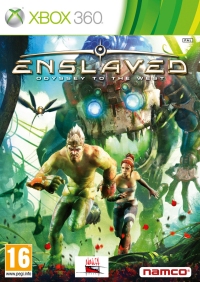
Format:
360
Genre:
Platforming
Style:
Thirdperson
Singleplayer
Further reading:
Porco Rosso
Buy/Support:
Support , click to buy via us...
Other GamePeople columnists have reviewed this from their perspective - huh?:
Family Gamer (360)
Returning Gamer (360)
Scared Gamer (360)
Considered Gamer (360)
Scripted Gamer (PS3)
Dressup Gamer (PS3)

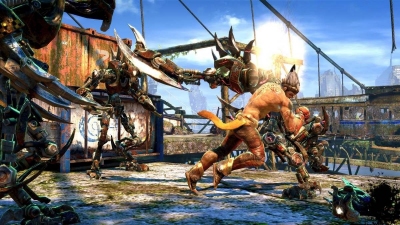

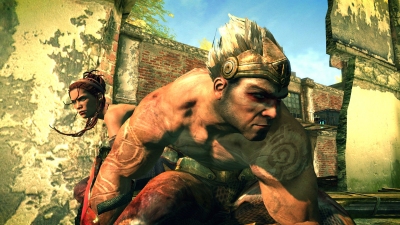
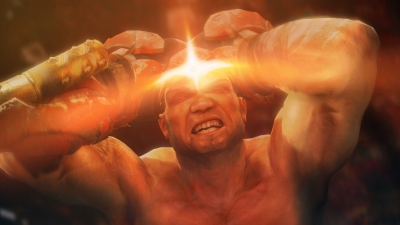
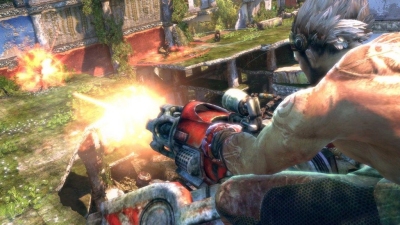

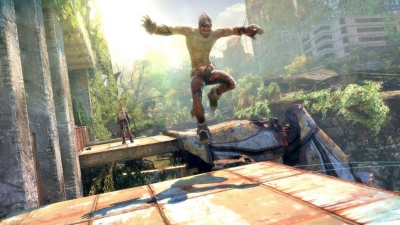

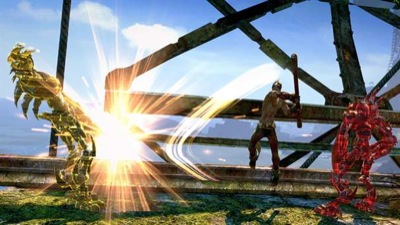



you know that dream where you wake up and you're a huge man except with a primate tail, and you're enslaved to a beautiful but fragile and distrusting woman from the future by means of a powerful mindcontrol headband? yeah, well Enslaved: Odyssey to the West basically starts from there.
as we all know, the rough shape of the narrative of that classic dream derives from the ancient, vernacular Ming dynasty story Hsi-yu chi, or Journey to the West, in which the Buddhist monk Xuanzang (probably my second or third favourite Buddhist monk in all of ancient Chinese literature) and his three protector/disciples, journey to India to find and bring back two sutras (scriptures) concerning transcendence and persuasion. the narrative of Enslaved, written by Alex Garland (The Beach, 28 Days Later, Sunshine), loosely drags Hsi-yu chi into the 22nd century for our gaming pleasure.
you (by which I also mean me. one) control(s) a monkey-man character based on Sun Wukong, the violent, but fiercely intelligent humanized companion of Xuanzang that we all so regularly become in our dreams. Monkey (played by Andy Serkis), as he is here called, starts out by escaping a slave ship just before it crashes. in fleeing his bonds, he is thrust together with (i.e.'bonds with') fellow slave Trip (played by Lindsay Shaw). however, their fledgling relationship is starkly cast as upon regaining consciousness, in the way people do in films, he discovers that she has made him her slave by means of a headband that forces him to obey her voice, and which yokes his survival to hers, forcing him to protect her in order to stay alive himself.
Trip needs Monkey, Monkey needs trip -- it's basically Romancing The Stone, with robots, and a monkey, and pig (who is basically Porco Rosso), in the future. without giving too much that you couldn't guess away, Monkey and Trip have both to come to terms with the nature of their new relationship and work their way across a significantly post-apocalyptic American landscape to search firstly for Trip's family, and then, once they turn out to be dead, for those responsible. despite the somewhat clichéd setup, however, what follows is a really enjoyable, narratively rich and aesthetically filmic 3D platform-puzzler.
despite the somewhat clichéd setup, what follows is a really enjoyable, narratively rich filmic 3D platform-puzzler.
there are some problems with the gameplay -- the controls are fairly sluggish, there are some serious framerate issues in places, some glitches with the backdrops (which occasionally leave you stuck, humping a wall while a big robot comes and smashes you right up), and a fairly turgid fight mechanic which only starts to get interesting about four fifths of the way through the game -- but for the most part it's a psychologically involving, sensually engaging and all-round entertaining experience.
Enslaved is the best and most sophisticated attempt i've seen so far to hybridise gaming and film, and, as such, runs head-first into a fundamental contradiction. however, one of the cleverest things about Enslaved is not just the skill with which it addresses this issue, but also the way it plays, knowingly and insightfully, with the ideas that lie behind the contradiction itself, which I'm eager to now discuss.
Enslaved plays with the concepts of the boundedness of the gamer as well as that of the characters.
several reviews that i've read have majored on the fact that 'for all the good stuff in Enslaved, right, it's annoying that you're forced to go along fixed routes and stuff, yeah'. while it is true that the game is fairly nannyish with the way it shows you where you are supposed to make Monkey jump or climb or bash next (by means of glowing ledges, ladders, etc.), that is, of course, precisely the price we must pay for something that has a rich and compelling narrative.
the whole notion of narrative relates to structure and discipline. the craft of a good writer, particularly when it comes to fiction, is the ability to mould a story in such a way that the reader is emotionally drawn into the events despite them occurring beyond the realm of the reader's influence. in the world of gaming, by contrast, we have become used to the idea that a well crafted world is one in which the gamer is 'free' to explore at will and indulge any whim. as designers attempt to bring sophisticated narrative elements to game design, therefore, they must struggle to synthesise this dialectic.
by exploring a story which is, at its heart, all about notions of freedom, slavery and duty -- bonds, physical and emotional -- Enslaved plays with the concepts of the boundedness of the gamer as well as that of the characters. just as Xuanzang's journey to India (and ultimately to enlightenment) was shaped and guided by the interventions of the Buddha and involved learning the virtue of submission as well as persuasion, so we, in playing Enslaved, must navigate the boundary between guiding Monkey and Trip, and being ourselves guided by the overarching narratological concerns of the game.
it is perhaps going too far to paint Enslaved as a thesis on various, competing philosophical narratives of freedom, but the content and shape of the story, the combination of an overgrown, post-apocalyptic New York setting and several references to 'trade', and the fact that the giant, enemy weapon is called Leviathan (invoking both the biblical monster and Hobbes' classic political treatise), all pointed me firmly in that direction.
for me it was ultimately the intelligent, literate and philosophically provocative narrative that made my experience of playing through Enslaved so rewarding.
it might take some time to get to the point where as gamers we are willing to relinquish control back to the game designer -- something of which we have become technologically and ideologically suspicious -- but if we want rich narratives and a meaningfully filmic experience which goes beyond the aesthetic, its an aspect that has to be negotiated. the thing that i liked most about Enslaved was the way in which it brought this notion to the surface by weaving it through the narrative thus highlighting its role in the gameplay.
however, to be honest, even if none of that means anything to you or ends up being even remotely a part of your experience, Enslaved has lots going for it. it looks beautiful, even if the sumptuous visuals are sometime spoiled by an awkward camera mechanic and framerate stutters, and it sounds fantastic, bringing together some solid sound design with a stirring score by Nitin Sawhney. the acting is of a very high quality, with strong voice work and the motion capture doing a really nice job of translating the physical efforts of the cast into the reactions of realistic, emoting characters. furthermore, the puzzles in and pacing of the game are both well conceived, with enough variety or task to prevent it becoming dull to guide the lumbering Monkey around, and a really well thought-out blend of general gameplay, nicely conceived set pieces and cut scenes.
for me, however, it was ultimately the intelligent, literate and philosophically provocative narrative that made my experience of playing through Enslaved so rewarding. while they might not get the blend spot on, the people behind this game have put a lot of thought into the conceptual tensions that lie at the heart of high-concept narrative gaming, and they've played satisfyingly with both the tensions and paradoxes that result from the combination of two somewhat incommensurate ideologies (the modern gamer's desire to engage with a compelling story and her desire to completely control the action), and mapped that tension onto a interesting, narrative exploration of post-modern notions of freedom and duty.
knowingly sacrifice the illusion of power and control in order to be a part of something greater than themselves.
Enslaved left me with a question as to whether, when faced with the option to escape (i.e. not to engage with the game on the basis that it's too restrictive) the majority of gamers are likely to choose, as Monkey does when Trip removes his headband, to stay and knowingly sacrifice the illusion of power and control in order to be a part of something greater than themselves? i don't know what the answer is, but i reckon the question is a version of one of the most important political and cultural questions that we as humans face.
[if you'd like to see more of the weird and wonderful world of reallyquitetired then the door is always open at his semi-detached house/blog]



reallyquitetired writes the Tired Gamer column.
"hello. I'm reallyquitetired -- recently described by Depressive Monthly magazine, in a probing centre-page feature, as 'Academic, DJ, blogger (with a penchant for odd humour, non-standard uses of language, frank reviews, utilizing fallacious quotations and recommending music to wash to) and Major Depressive Disorder sufferer extraordinaire.'"
Here are the games I've been playing recently:
© GamePeople 2006-13 | Contact | Huh?

|
Family Video Game Age Ratings | Home | About | Radio shows | Columnists | Competitions | Contact
With so many different perspectives it can be hard to know where to start - a little like walking into a crowded pub. Sorry about that. But so far we've not found a way to streamline our review output - there's basically too much of it. So, rather than dilute things for newcomers we have decided to live with the hubbub while helping new readers find the columnists they will enjoy. |
Our columnists each focus on a particular perspective and fall into one of the following types of gamers:
|